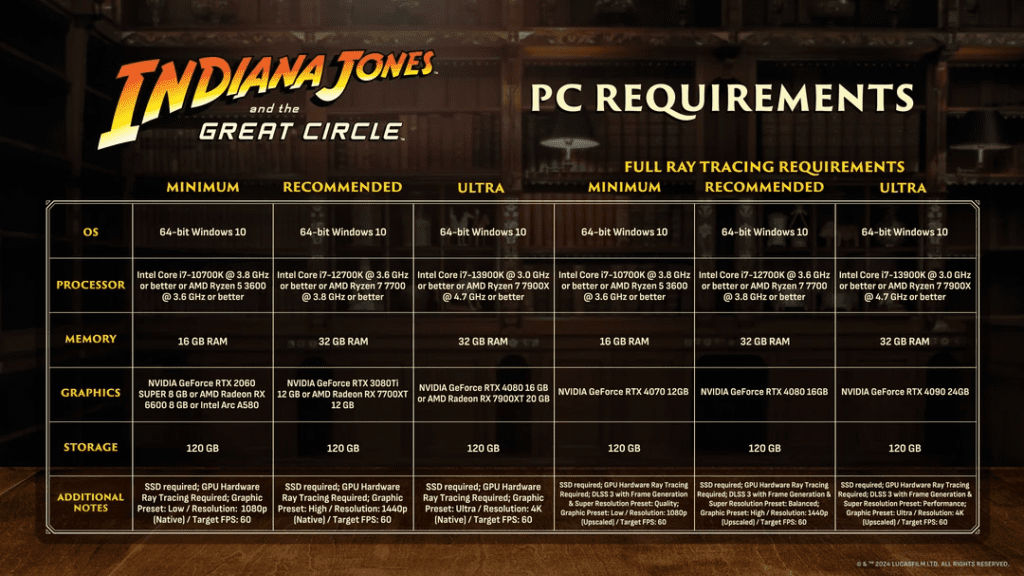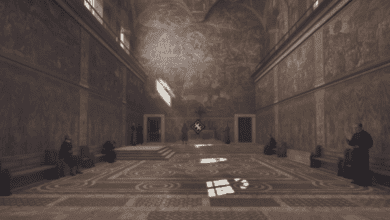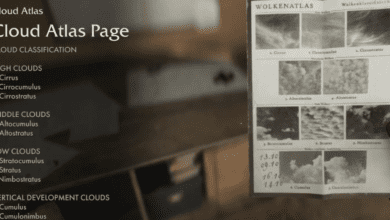Best Graphics Settings for Indiana Jones and the Great Circle: Optimize Your RTX 3070 and 3070 Ti for Stunning Gameplay
Key Takeaways:
- Early Access Now: Premium Edition owners can enjoy the game starting December 6, 2024.
- Optimized Performance: Tailored settings for Nvidia RTX 3070 and RTX 3070 Ti GPUs ensure smooth gameplay at 1440p resolution.
- Future-Ready Graphics: The game employs advanced graphics techniques, including ray tracing, setting new standards for visual fidelity.
“Indiana Jones and the Great Circle” launches officially on December 9, 2024, but Premium Edition players can dive in early. This highly anticipated title from Bethesda Softworks promises an immersive experience, combining intricate storylines with cutting-edge graphics. However, the game’s demanding system requirements have raised eyebrows. If you’re running an Nvidia RTX 3070 or RTX 3070 Ti, tweaking your graphics settings is essential for a smooth gaming experience at 1440p.

This guide walks you through the best configurations to maximize performance without sacrificing visual quality.
Why Optimized Graphics Settings Matter
Modern games often push hardware to its limits, and “Indiana Jones and the Great Circle” is no exception. With features like ray tracing and high-resolution textures, the game demands robust hardware. The RTX 3070 and 3070 Ti, though capable, require specific configurations to maintain a stable 60 FPS while delivering an immersive visual experience.
Recommended Graphics Settings for RTX 3070

Screen Setup
- Display Mode: Fullscreen
- Monitor: Set to your primary display
- Aspect Ratio: 16:9 (Native)
- Resolution: 2560×1440
Graphics Settings
- Picture Framing: Fullscreen
- HUD Safe Zone: Default
- Field of View (FOV): 90
- Vertical Sync: Off (Enable if you lack G-Sync or FreeSync)
- FPS Limit: 60
- Brightness & HDR: Default (Enable HDR only with a compatible monitor)
- Motion Blur: Off
- Chromatic Aberration: Off
- Sharpening: 50
- Film Grain: Off
- Depth of Field: Off
- Depth of Field Anti-Aliasing: Off
Graphics Quality
- Overall Graphics Quality: Custom
- Texture Pool Size: Medium
- Shadow Quality: Medium
- Decal Rendering Distance: High
- Global Illumination Quality: Ultra
- Reflection Quality: Ultra
- Motion Blur Quality: Low
- Water Quality: High
- Volumetrics Quality: High
- Hair Quality: High
- Texture Anisotropic Filtering: Medium
Advanced Video Settings
- Upscaling: DLSS
- DLSS Super Resolution: Quality
- DLSS Frame Generation: Off
- Resolution Scaling: Off
- Dynamic Resolution Scaling Target: Default
Color Filter
- Mode: Off
- Brightness: 50
- Contrast: 33
- Intensity: 72
- Strength: 100
High Contrast Effect
- Mode: Off
- Strength: 82
Recommended Graphics Settings for RTX 3070 Ti
The RTX 3070 Ti offers a slight performance edge over the RTX 3070, making it ideal for minor tweaks.
Screen Setup
Same as RTX 3070.
Graphics Settings
- Match all configurations listed for the RTX 3070.
Graphics Quality Tweaks
- Shadow Quality: High (instead of Medium)
- Texture Pool Size: High (instead of Medium)
- Volumetrics Quality: Ultra
These upgrades leverage the Ti’s extra power, enhancing visuals without compromising the frame rate.
Performance Insights and Ray Tracing Challenges
“Indiana Jones and the Great Circle” uses ray tracing as a default feature across all settings, making optimization crucial. The game leverages a modified id Tech engine, renowned for its visual fidelity but notorious for being hardware-intensive. While DLSS technology alleviates some strain, achieving consistent performance with high-end settings is a challenge, even for modern GPUs like the RTX 4090.
Comparing RTX 3070 and 3070 Ti Performance
- RTX 3070: Balances graphical fidelity and performance at medium-to-high settings.
- RTX 3070 Ti: Delivers enhanced textures and lighting, with room for additional visual effects.
Both GPUs achieve playable frame rates at 1440p but may struggle with full ray tracing enabled.
The Future of Gaming Hardware Requirements
The game’s high hardware demands reflect a broader trend in the gaming industry. Developers increasingly rely on advanced technologies like ray tracing and path tracing to create realistic environments, often at the expense of performance on mid-tier hardware.
FAQs
1. What makes ray tracing so demanding?
Ray tracing simulates realistic lighting by calculating the interaction of light with objects in real time, requiring significant GPU power.
2. Why is DLSS important for this game?
DLSS (Deep Learning Super Sampling) uses AI to upscale lower-resolution frames, improving performance without a noticeable drop in visual quality.
3. Can lower-tier GPUs run the game?
Yes, but expect significant compromises in visual fidelity and frame rates. Stick to 1080p resolution and lower settings.
4. Will future updates improve optimization?
Patches often address performance issues, so optimization for mid-tier GPUs may improve over time.
5. Should I upgrade my hardware for this game?
Consider upgrading if you aim for 4K resolution or ultra settings with ray tracing.





